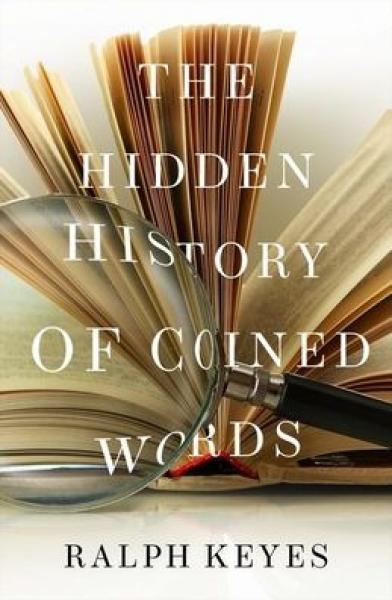Description
etymological underworld of terms and expressions and uncovers plenty of hidden gems.
He also finds some fascinating patterns, such as that successful neologisms are as likely to be created by chance as by design. A remarkable number of new words were coined whimsically, originally intended to troll or taunt. Knickers, for example, resulted from a hoax; big bang from an insult.
Casual wisecracking produced software, crowdsource, and blog. More than a few resulted from happy accidents, such as typos, mistranslations, and mishearing (bigly and buttonhole), or from being taken entirely out of context (robotics). Neologizers (a Thomas Jefferson coinage) include not just
scholars and writers but cartoonists, columnists, children's book authors. Wimp originated with a book series, as did goop, and nerd from a book by Dr. Seuss. Coinages are often contested, controversy swirling around such terms as gonzo, mojo, and booty call. Keyes considers all contenders, while
also leading us through the fray between new word partisans, and those who resist them strenuously. He concludes with advice about how to make your own successful coinage.
The Hidden History of Coined Words will appeal not just to word mavens but history buffs, trivia contesters, and anyone who loves the immersive power of language.
"How do words get coined? That question is explored in Ralph Keyes's latest book, The Hidden History of Coined Words. Based on meticulous research, Keyes has determined that successful neologisms are as likely to be created by chance as by intention. A remarkable number of new words were coined whimsically, he's discovered, to taunt, even to prank. Knickers resulted from a hoax, big bang from an insult. Wisecracking produced software, crowdsource, and blog. More than a few neologisms weren't even coined intentionally: they resulted from happy accidents such as typos, mistranslations, and misheard words like bigly and buttonhole, or from an unintended coinage such as Isaac Asimov's robotics. Many of the word coiners Keyes writes about come from unlikely quarters. Neologizers (a Thomas Jefferson coinage) include not just learned scholars and literary lions but cartoonists, columnists, children's authors, and children as well. Wimp, Keyes tells us, originated with an early 20th century book series on The Wymps, goop from a series about The Goops, and nerd from a book by Dr. Seuss. Competing claims to have coined terms like gonzo, mojo, and booty call are assessed, as is epic battles fought between new word partisans, and those who think we have enough words already. A concluding chapter offers pointers on how to coin a word of one's own. Written in a reader-friendly manner, The Hidden History of Coined Words will appeal not just to word lovers but history buffs, trivia contesters, and anyone at all who is interested in a well-informed good read"--
"Ralph Keyes is a legend for his accurate and very entertaining books about language. Now, in The Hidden History of Coined Words, he has written the best book ever produced on the fascinating stories and processes of how new words are created." -- Fred Shapiro, Editor of The New Yale Book of
Quotations
"Ralph Keyes looks at the history of coined words to explore how creativity itself works in language. Few word books are both this entertaining and this accurate; even fewer also manage to say anything new. This riveting book does it all." -- Jesse Sheidlower, Former Editor at Large of the Oxford
English Dictionary and past president of the American Dialect Society
"If my reaction is typical, people will start reading and not be able to put it down. It's very witty and learned -- and interesting!" -- Landon Y. Jones, author of The Essential Lewis and Clark
"The Hidden History of Coined Words is filled with intriguing information. Anyone who loves words, the history of language, or well-told stories will be glad they read this fascinating book." -- Rosalie Maggio, author of How to Say It: Choice Words, Phrases, Sentences & Paragraphs for Every
Situation
"Eloquent and instructive...Mr. Keyes's range of reference is admirable...every page contains toothsome detail. Mr. Keyes is as happy recalling the (imaginary) Brooklyn hoodlum Evil-Eye Fleagle, exponent of the "double whammy," as he is describing Victorian neurologists." The Wall Street Journal
"I highly recommend the writer Ralph Keyes' 'The Hidden History of Coined Words.' If you are a history nerd like me, you will enjoy Mr. Keyes' exuberant celebration of how some of the words in our lexicon came to be...Mr. Keyes' book has been eye-opening for me, and he tells a good story." --Deb
Amlen, The New York Times
"With his new book, ''The Hidden History of Coined Words', Keyes, who has written about retro language, euphemisms and much more, reveals other surprising origins of common words." --New York Post
"'The Hidden History of Coined Words' by Ralph Keyes, an American author and former language columnist, is an engaging look at this endeavour." --The Economist
""The Hidden History of Coined Words' is cleverly and humorously written and well researched by a superb author who has the intelligence to make the potentially difficult subject matter accessible and interesting to just about anyone. It is, in fact, very addictive and offers surprises on every
page." On: Yorkshire
Product Details
- Oxford University Press, Brand
- Mar 1, 2021 Pub Date:
- 0190466766 ISBN-10:
- 9780190466763 ISBN-13:
- 392 Pages
- 9.4 in * 6.2 in * 1.3 in Dimensions:
- 2 lb Weight:




